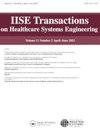为农村地区服务的门诊初级保健机构错过预约的多阶段预测模型
IF 1.5
Q3 HEALTH CARE SCIENCES & SERVICES
IISE Transactions on Healthcare Systems Engineering
Pub Date : 2020-12-17
DOI:10.1080/24725579.2020.1858210
引用次数: 8
摘要
ABSTRAT错过预约是医疗保健行业效率低下的一个重要原因。许多研究人员已经在各种医疗环境中研究了这个问题。然而,一些研究关注的是预测为农村地区服务的门诊初级保健机构的错过预约。这项研究全面调查了在一家服务于农村地区的门诊初级保健医疗中心发生的两种类型的错过预约(无预约和取消预约)背后的因素,并开发了一个预测模型来降低其发生率。这项研究分三个主要阶段进行。首先,进行了探索性数据分析,以发现与错过约会有关的模式。其次,分析了一些属性与预约状态之间的关联。第三,考虑了三种预测模型——二元、多类、多阶段链——用于错过预约。第三个模型是一个新提出的多阶段链模型,用于预测错过的约会。三个模型中使用了机器学习分类器,包括逻辑回归、决策树和基于树的集成分类器。研究发现,预约提前期是错过预约的关键驱动因素。多级链模型产生了最好的结果,准确率为73.0%,召回率为73.3%,F1得分为73.0%和准确率为7.33%。根据这一分析,提出了一些干预措施,以减少错过的预约。本文章由计算机程序翻译,如有差异,请以英文原文为准。
A Multi-Stage predictive model for missed appointments at outpatient primary care settings serving rural areas
ABSTRAT Missed appointments are a significant cause of inefficiency in the healthcare industry. Many researchers have studied this problem in various healthcare settings. However, a few studies are concerned with predicting missed appointments at outpatient primary care settings serving rural areas. This study holistically investigates the factors behind two types of missed appointments - no shows and cancelations - at an outpatient primary care medical center serving rural areas and develops a predictive model to reduce their incidence. The study was carried out in three main phases. First, exploratory data analysis was conducted to discover the patterns related to missed appointments. Second, the association between some of the attributes and appointment status was analyzed. Third, three prediction models – binary, multi-class, multi-stage chain - were considered for missed appointments. The third model is a new proposed multi-stage chain model to predict missed appointments. Machine learning classifiers including logistic regression, decision tree, and tree-based ensemble classifiers were used in the three models. It was found that appointment lead time is a key driver for missed appointments. The multi-stage chain model produced the best results with 73.0% precision, 73.3% recall, 73.0% F1-score, and 73.3% accuracy. Based on this analysis, several interventions were proposed to reduce missed appointments.
求助全文
通过发布文献求助,成功后即可免费获取论文全文。
去求助
来源期刊

IISE Transactions on Healthcare Systems Engineering
Social Sciences-Safety Research
CiteScore
3.10
自引率
0.00%
发文量
19
期刊介绍:
IISE Transactions on Healthcare Systems Engineering aims to foster the healthcare systems community by publishing high quality papers that have a strong methodological focus and direct applicability to healthcare systems. Published quarterly, the journal supports research that explores: · Healthcare Operations Management · Medical Decision Making · Socio-Technical Systems Analysis related to healthcare · Quality Engineering · Healthcare Informatics · Healthcare Policy We are looking forward to accepting submissions that document the development and use of industrial and systems engineering tools and techniques including: · Healthcare operations research · Healthcare statistics · Healthcare information systems · Healthcare work measurement · Human factors/ergonomics applied to healthcare systems Research that explores the integration of these tools and techniques with those from other engineering and medical disciplines are also featured. We encourage the submission of clinical notes, or practice notes, to show the impact of contributions that will be published. We also encourage authors to collect an impact statement from their clinical partners to show the impact of research in the clinical practices.
 求助内容:
求助内容: 应助结果提醒方式:
应助结果提醒方式:


